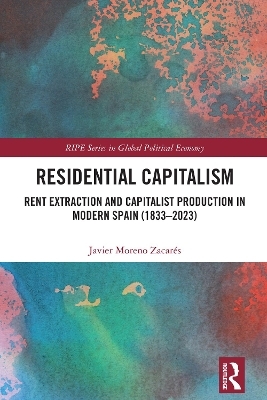
Residential Capitalism
Routledge (Verlag)
978-1-032-07925-7 (ISBN)
Over the last decade, Spain has become an emblem of the contradictory relationship between capitalism and housing. During the house-price boom of the 2000s, Spain built homes on an unprecedented scale, with output levels that overshadowed those of every major European economy. Nevertheless, when the fortunes of real estate markets turned, a wave of repossessions ensued, and a massive number of households were thrown out into the street as a sizeable portion of the housing stock was lying vacant. In turn, the implosion of Spanish residential capitalism triggered an intense wave of unrest that has come to shape a decade of political turmoil.
This book uses the Spanish case to bring to light, and theorise, the workings of residential capitalism. The author traces the evolution of residential provision from the nineteenth century to the present, situating the transformation of the housing market in a context of ongoing social change and conflict. The book shows how the present needs to be understood by looking at the historical process through which residential provision became subsumed under the logic of capitalist accumulation but also at a long genealogy of struggles around urbanisation and housing, the outcomes of which remain crystallised in Spain’s urban institutions. The author reveals how both residential capitalist development and urban social conflict have constituted each another, casting light on the historical relationship between housing crises, urban unrest, and the evolution of real estate markets. The book develops a historicist framework to understand residential capitalism, an important contribution for an age in which real estate markets have come to determine the rhythms of global capital.
Addressing key issues and debates in the field, including the financialisation of housing, the politics of scale and urban entrepreneurialism, the political economy of the Eurozone, and the history of capitalist development, this book will be of great interest to students and scholars of political economy, as well as those engaged in crossover fields such as housing studies, urban geography, or financial geography.
Javier Moreno Zacarés is Assistant Professor of International Political Economy in the School of Government and International Affairs at Durham University, UK.
PART I: Housing Under Capitalism
1 Residential Capitalism: A Theoretical Introduction
Housing’s Paradoxes
Capitalists and Rentiers
Hybrid Logics
What Is (Residential) Capitalism?
A Pre-History of Residential Capitalism
Mass Urbanisation
Capitalist Residential Production
Governing Residential Capitalism
Capital, Hegemony, and the State
Historicising Residential Strategies
Outline of the Book
2 Residential Accumulation in Capitalist Political Economies
Residential Accumulation: Between Rent Extraction and Capitalist Production
The Hybridity of Housing Provision
House Rents in the Capitalist Economy
Residential Social-Property Relations: Analysing Capitalist Housing Provision
Production
Exchange
Finance
Reproduction
PART II: The Liberal Era, 1833–1939
3 Liberal Property and Its Discontents
The Formation of the Liberal State
Framing the Liberal Revolution
Imperial Decline
The Liberal City in an Uneven Capitalist Transition
A Pre-Capitalist Agriculture
Capitalist Production and Mass Urbanisation
The Urban Household
Pacifying the Urban Masses
Spatial Politics of the Liberal Oligarchy
Competing State Projects
Morbid Symptoms
4 The Contradictions of the Liberal City
The Construction of the Liberal City
The Creation of Absolute Private Property
The Rise of the Market-Dependent Rentier
The Capitalist Transition in the Building Trades
Repairing the Liberal City
Faulty Extensions: The Ensanches
Structural Failure: The Underdevelopment of Property Development
Foundational Problems: Towards a Social Liberalism
The Collapse of the Liberal City
The False Promise of Liberal Property
The Unravelling
PART III: Franco’s Dictatorship, 1939–75
5 The Reconstruction of Urban Modernity
Political Anatomy of the Francoist State
The Roots of the Counter-Revolution
Bureaucratic Factionalism in the National Movement
Catch-Up Development and Accelerated Urbanisation
Post-War Autarky
Geopolitical Realignment and Technocratic Turn
The ‘Spanish Economic Miracle’
Catholic Domestication
Domination and Unrest in the Francoist City
The Limits to Urban Hegemony
Death and Resurrection of Urban Unrest
6 The Property-Owning Autocracy
Falangist Designs
Orchestrate the City
Nurture the Developer
Euthanise the Landlord
Urbanise the Smallholder
Developmentalist Consolidation
Turf War in the Bureaucracy
An Urban State of Exception
The Professionalisation of the Capitalist Developer
Democratic Horizons
The Working Class Goes to Heaven?
Democracy Against Residential Capitalism
PART IV: The ‘Regime of 1978’, 1975–2023
7 Neoliberalism and the Asset-Price Economy
Foundations of the New Liberal State
The Constitutional Settlement
The State of Autonomies
Neoliberal Democracy: A Second Restoration?
Neoliberal Restructuring and Asset-Price Speculation
The Onset of Neoliberalism
Experimenting With Financialisation
The Road to the Great Recession
Urbanisation in a Rentierised Economy
The Rise of Urban Entrepreneurialism
The Party-Developer Nexus
The Crisis of Neoliberal Hegemony
European ‘Modernisation’ and the Petit Rentier
Housing Crash and Hegemonic Breakdown
The Crisis of the Constitutional Settlement
8 The Democratisation of Rentierism
Neoliberalising Housing Provision
Supporting the Homebuyer
The Liberalisation of Mortgage Finance
New Extremes in Capitalist Building
Rent and Residence in the Era of Mass Speculation
Climbing Up the Property Ladder
The Primacy of the Developer
‘House Prices Never Go Down’
Crisis and Recomposition of Residential Capitalism
Lineages of the New Urban Activism
The Repoliticisation of Residential Capitalism
Rise and Fall of the New Municipalism
The Revenge of the Landlord
Towards a New Moral Economy?
Concluding Remarks
| Erscheinungsdatum | 21.04.2024 |
|---|---|
| Reihe/Serie | RIPE Series in Global Political Economy |
| Zusatzinfo | 14 Line drawings, black and white; 2 Halftones, black and white; 16 Illustrations, black and white |
| Verlagsort | London |
| Sprache | englisch |
| Maße | 156 x 234 mm |
| Gewicht | 621 g |
| Themenwelt | Naturwissenschaften ► Biologie ► Ökologie / Naturschutz |
| Naturwissenschaften ► Geowissenschaften ► Geografie / Kartografie | |
| Sozialwissenschaften ► Soziologie ► Spezielle Soziologien | |
| Wirtschaft ► Volkswirtschaftslehre ► Wirtschaftspolitik | |
| ISBN-10 | 1-032-07925-8 / 1032079258 |
| ISBN-13 | 978-1-032-07925-7 / 9781032079257 |
| Zustand | Neuware |
| Informationen gemäß Produktsicherheitsverordnung (GPSR) | |
| Haben Sie eine Frage zum Produkt? |
aus dem Bereich


